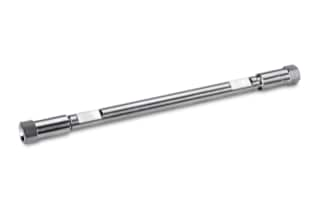
|
Chemistry |
C18 |
|
Separation Mode |
Reversed Phase |
|
Particle Substrate |
Silica |
|
pH Range Min |
2 pH |
|
pH Range Max |
8 pH |
|
Maximum Pressure |
6000 psi (415 Bar) |
|
Endcapped |
Yes |
|
Bonding Technology |
T3 |
|
Silanol Activity |
Medium |
|
Particle Shape |
Spherical |
|
Particle Size |
3 µm |
|
Endfitting Type |
Waters |
|
Pore Size |
100 Å |
|
Format |
Column |
|
Surface Area |
330 |
|
System |
HPLC |
|
USP Classification |
L1 |
|
Inner Diameter |
2.1 mm |
|
Length |
100 mm |
|
Carbon Load |
14 % |
|
UNSPSC |
41115709 |
|
Brand |
Atlantis |
|
Product Type |
Columns |
|
Units per Package |
1 pk |
Atlantis T3 Column, 100Å, 3 µm, 2.1 mm X 100 mm, 1/pk
By providing a balanced retention of polar and hydrophobic molecules, Atlantis T3 columns are able to solve one of the largest analytical problems cited by chromatographers today in a single piece of lab equipment. With selective optimization of pore diameter, C18 ligand density, and a proprietary end-capping process, the Atlantis T3 column is able to provide superior retention for polar compounds. This is achieved while exhibiting industry-leading peak shape and efficiency across all analytes with exceptional chemical stability across a wide pH range.
Intelligent stationary phase design is the key to the remarkable performance of Atlantis T3 Columns, as Waters’ advanced T3 bonding process utilizes a trifunctional C18 alkyl phase, bonded at an intermediate 1.6 µmol/m2 ligand density to promote polar compound retention. This lower ligand density allows for analytes to more easily access the material’s pore structure of the material, where over 99% of chromatographic retention occurs, leading to enhanced retention capabilities.
Atlantis T3 columns are able to resist ligand cleavage by using a trifunctional attachment of the C18 phase to the particle surface, leading to exceptional column lifetime at low pH. In addition to improved lifetime through intermediate ligand density, Atlantis T3 columns deliver an optimal balance of peak shape and retention due to a low concentration of residual surface silanols.
The process of manufacturing an Atlantis T3 column begins with ultrapure reagents to control the chemical composition and purity of the final product. Columns are manufactured in a cGMP, ISO 9001:200 certified plant, and each step of the process is conducted within narrow tolerances. Each column is individually tested. You can perform chromatographic testing using a Reversed-Phase QC Reference Material.
What Is A Hydrophobic Molecule?
Hydrophobic literally translates to a fear of water, so these molecules repel water. Oil is a common example of a hydrophobic molecule. These are usually non-polar, meaning the atoms that compose the molecule do not produce a static electric field and that the molecule cannot form hydrogen bonds with water. The water molecules then form hydrogen bonds with themselves, while the non-polar molecules clump together. Some examples of hydrophobic molecules and substances include cell membranes, plant leaves, any greasy substances like alkanes, oils, or fats, and other organic compounds.